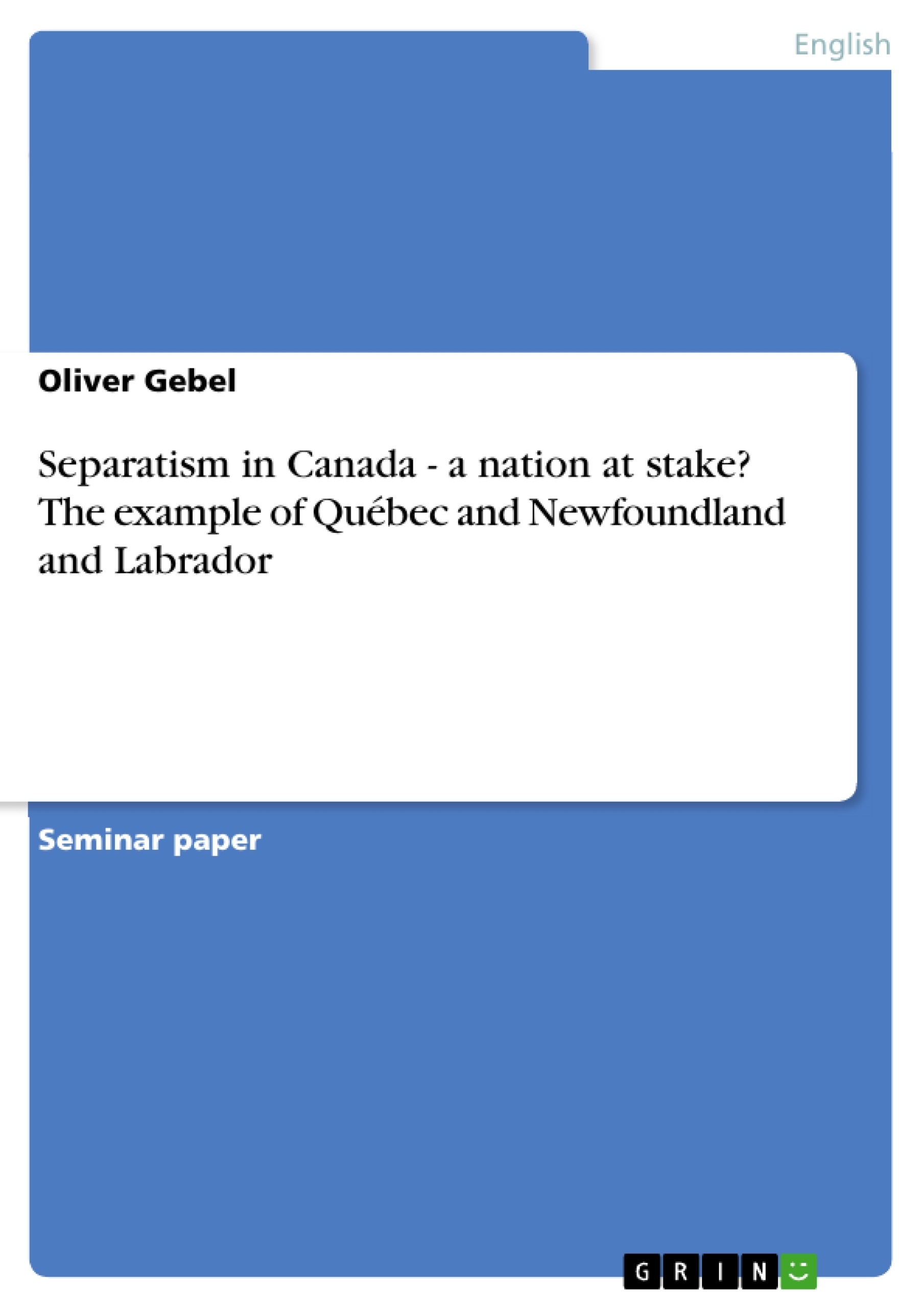This paper examines the historical reasons for the current developments concerning the issue of separatism within Canada. The "classic" cleavages between the federal government and Québec as well as the occurences in Newfoundland and Labrador are presented and analysed in detail.
Table of Contents
- Canadian Identity and Separatism: Quo vadis Canada ?
- The Ontology of Separatism
- Definition and Implications
- The Emergence of Separatism since the 18th century
- Québec the Reluctant Province
- Separatism in Newfoundland and Labrador
- Synopsis and Future Perspectives
Objectives and Key Themes
This paper examines the current state of separatist movements in Canada, analyzing the reasons behind resentments against the central government in Ottawa, particularly in Québec and Newfoundland and Labrador. It investigates the historical background, highlighting the impact of Anglo-French rivalry in North America and the ongoing debate about Canadian identity and national consciousness.
- Canadian identity and the complexities of national consciousness
- Historical and contemporary factors contributing to separatist sentiment in Canada
- The role of regionalism and provincial identities in shaping Canadian society
- The impact of the relationship with the United States on Canadian national identity
- The specific case of Québec separatism and its historical roots
Chapter Summaries
- Canadian Identity and Separatism: Quo vadis Canada?: This chapter explores the intricacies of Canadian identity, arguing that despite economic prosperity and social development, a cohesive national consciousness has not yet formed. It analyzes the role of regionalism and the impact of historical events, particularly the Anglo-French rivalry, on the formation of Canadian identity. The chapter introduces the concept of separatism and its significance in understanding the dynamics of Canadian society.
- The Ontology of Separatism: This chapter defines separatism as a political phenomenon and examines its historical emergence since the 18th century. It discusses the motivations behind separatist movements, particularly the desire for sovereignty and self-determination. The chapter provides a theoretical framework for understanding the motivations and complexities of separatism.
- Québec the Reluctant Province: This chapter focuses on the specific case of Québec separatism, tracing its roots back to the historical rivalry between French and English settlers in North America. It examines the social, cultural, and political factors contributing to the persistence of separatist sentiment in Québec, exploring the ongoing debate about language, identity, and autonomy.
- Separatism in Newfoundland and Labrador: This chapter explores the dynamics of separatist sentiment in Newfoundland and Labrador, contrasting it with the situation in Québec. It analyzes the historical context, including the province's unique relationship with Canada and its economic challenges, and explores the reasons for the emergence of separatist movements in this region.
Keywords
Canadian identity, separatism, regionalism, national consciousness, Québec, Newfoundland and Labrador, Anglo-French rivalry, historical context, cultural identity, political autonomy, sovereignty, self-determination.
Frequently Asked Questions
What are the main separatist regions discussed in the paper?
The paper focuses on separatist movements in Québec and the province of Newfoundland and Labrador.
Why is Québec referred to as the "reluctant province"?
This refers to Québec's historical roots of separatism stemming from the Anglo-French rivalry and its ongoing struggle for cultural and political autonomy.
How does Canadian identity relate to separatism?
The author argues that a cohesive national consciousness has not fully formed in Canada, with regional and provincial identities often taking precedence over a unified national identity.
What is unique about separatism in Newfoundland and Labrador?
Unlike Québec's linguistic focus, separatism in Newfoundland and Labrador is analyzed through its unique historical relationship with Canada and its specific economic challenges.
What historical conflict influenced Canadian separatism?
The 18th-century Anglo-French rivalry in North America is cited as a foundational reason for the current separatist sentiments.
What are the core motivations behind separatist movements?
The primary motivations identified are the desire for sovereignty, self-determination, and protection of regional cultural identities.
- Citar trabajo
- Oliver Gebel (Autor), 2005, Separatism in Canada - a nation at stake? The example of Québec and Newfoundland and Labrador, Múnich, GRIN Verlag, https://www.grin.com/document/40009



